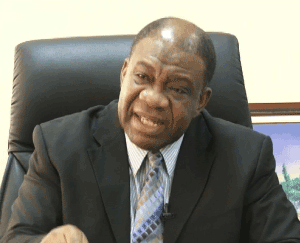Nigeria and its African countries now seem poised, through collaboration, to tackle the problem of energy that had made the continent the butt of jokes in the international arena, writes Special Correspondent, IDU JUDE.
Chinedu Nebonebo
The Minister of Power, Prof. Chinedu Nebo, has expressed federal government’s determination to rid Africa of darkness through sub-regional collaborations that would ensure a robust transmission super grid, running through every country in Africa.
According to him, this will bring about cooperation among countries in the region, drawing on their areas of strength for the collective good of the entire continent.
Speaking recently when Dr. Kandeh Yumkella, the Under Secretary-General and Special Representative of the United Nations (UN) Secretary-General, paid him a courtesy visit in Abuja, Nebo stated that the African Energy Leaders Group (AELG) championed by the UN was a welcome development, as it is targeted at the transformation and uplift of the region.
He further stressed the need for the group to give renewable energy a boost, to ensure that communities that are far-flung from the national grid are adequately powered with electricity, to promote the siting of small-scale industries in such African communities.
The minister further empathised with the students disqualified by the Joint Admissions and Matriculation Board (JAMB) over deficiencies in information and communication technology (ICT), adding that such a development would not have occurred had adequate electricity been provided for rural dwellers to expose such students to computers and information technology (IT).
While stressing that “our common destiny is being threatened by lack of access to power”, he added that with the growing population, the need for reinforcement can never be over-emphasised, as it will avert the looming threat in the future without energy.
Earlier, Yumkella said he had come to intimate the country on the need for the AELG, an initiative borne out of the vacuum observed from the Millennium Development Goals (MDGs), which focused more on social development, without energy – a key factor in the sustainability of the programme.
The group, he said, aims at providing universal access to energy by 2030, improve energy efficiency and double the share of renewable energy mix in the global reach.
According to him, Nigeria, which is a case study for other African countries – because of the success of its power sector privatisation exercise – will head the West Africa sub-region of the group.
He further said that the consultations were on-going with financial conglomerates such as Bank of America, Brazil and other stakeholders to produce some of the instruments that would facilitate the provision of regular power to Africa.
The minister, since the energy privatisation programme and implementation, has involved all facets of the economy as well as the international community and investors in the energy industry to invest in the Nigerian energy sector.
To show how critical the energy sector is to the development of any nation, United States President, Barack Obama, had on Tuesday, August 5, charged the African leaders to do more in that aspect. Nigeria was part of the summit attended by President Goodluck Jonathan.
He emphasised the need for infrastructural development, especially electricity, even as he promised the continent that the U.S. would assist with $7 billion (about N1.1 billion) to promote trade with Africa.
He said the target was to “ensure that there is provision of electricity that will cover 60 million African businesses”, stating that the continent has a great market potential which is why U.S. is partnering to build trade relationship with Africa.
The U.S. president also stressed the need to particularly empower young African entrepreneurs who will in turn create jobs and opportunities, not only for now but for future generations.
He also reiterated the need to expand trade on the continent and try to empower women and youths by making available to them conducive business environment.
Nigeria currently generates around 4,500 megawatts (MW) of electricity, but requires about 200,000MW to meet current energy demands.
“We need a robust energy mix for security purposes. As a nation, it is not expedient to have a source or two; we need a good mix of power. We now have wind turbines and solar power being commissioned; but we are still far considering our potentials.
“Only recently, a South Korean firm has agreed to produce for us 1,000 solar panels every year, for the next 10 years. Some parts of Nigeria are known to be good for wind; this will be good for our off-grid rural folks, who we intend to focus on under the Rural Electrification Scheme.
“We are ready to receive genuine investors from London, to key into our power sector investment. We are not insular. Those who see the potential and jump at it will never regret,” Nebo said recently while speaking to a group of British businessmen led by the Lord Mayor of the City of London, Roger Gifford.











